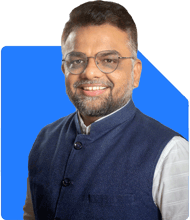Ramalingam Kalirajan |10881 Answers |Ask -Follow
Mutual Funds, Financial Planning Expert - Answered on Jul 11, 2024
He has an MBA in finance from the University of Madras and is a certified financial planner.
He is the director and chief financial planner at Holistic Investment, a Chennai-based firm that offers financial planning and wealth management advice.... more

I am 29. I am investing 10k in ICICI pru Flexi cap, 5k in Parag Parikh Flexi cap, 5k in Nippon India Small Cap, 5k in SBI Nifty Midcap 150 Index fund, 2.5k in Quant Midcap, 2.5k in Nippon Multi cap. Will this be good for a long term investment? Say around 20 years.
Review of Current Investments
Your portfolio is diversified across flexi-cap, small-cap, mid-cap, and multi-cap funds, including an index fund. This mix is good for spreading risk and capitalizing on growth opportunities in different market segments. Each type of fund has its characteristics, benefits, and risks.
Assessing the Current Portfolio
1. Portfolio Diversification:
Your portfolio's diversification is commendable. You have invested in various fund categories, which is crucial for risk management.
2. Allocation Breakdown:
Flexi-cap Funds: 50% allocation.
Small-cap Funds: 17% allocation.
Mid-cap Funds: 20% allocation.
Multi-cap Funds: 13% allocation.
3. Risk and Return Balance:
This allocation provides a balance between high growth potential (small and mid-cap funds) and stability (flexi-cap and multi-cap funds).
Enhancing Your Investment Strategy
1. Increase SIP Amount Periodically:
Consider increasing your SIP amount by 10% annually. This will significantly enhance your corpus over the long term. For example, increasing your SIPs yearly can amplify your investment growth, thanks to the power of compounding.
2. Regular Portfolio Review:
Review your portfolio's performance at least once a year. This ensures you stay aligned with your financial goals and make necessary adjustments.
3. Rebalancing:
Rebalancing helps maintain your desired asset allocation. It involves selling some investments that have performed well and buying more of those that haven’t, to maintain a target allocation.
Power of Compounding
Compounding is your best friend in long-term investing. The longer you stay invested, the more your money works for you. Reinvesting your returns leads to exponential growth.
1. Long-Term Growth:
Compounding allows your investments to grow faster as you earn returns on both your initial investment and the accumulated returns over time.
2. Patience Pays:
The key to benefiting from compounding is patience. Stay invested for the long haul and avoid the temptation to withdraw funds prematurely.
Advantages of Mutual Funds
1. Professional Management:
Mutual funds are managed by experienced fund managers who make informed investment decisions on your behalf.
2. Diversification:
They offer diversification across various sectors and asset classes, reducing the risk of significant losses.
3. Liquidity:
Mutual funds are highly liquid, meaning you can redeem your investments relatively easily when needed.
4. Flexibility:
There are various types of mutual funds to suit different risk appetites and investment goals.
Evaluating Fund Categories
1. Flexi-Cap Funds:
These funds invest in companies of all sizes and offer flexibility and diversification. They adjust their portfolio mix based on market conditions, aiming for optimal returns.
2. Small-Cap Funds:
Small-cap funds invest in smaller companies with high growth potential but come with higher volatility. They can offer substantial returns over the long term if you can withstand short-term market fluctuations.
3. Mid-Cap Funds:
Mid-cap funds invest in medium-sized companies with strong growth prospects. They strike a balance between the stability of large-caps and the high growth potential of small-caps.
4. Multi-Cap Funds:
Multi-cap funds invest across large-cap, mid-cap, and small-cap stocks. They provide a balanced approach, reducing risk while aiming for growth.
5. Index Funds:
Index funds aim to replicate the performance of a specific market index. They offer lower expense ratios but might not outperform the market. Actively managed funds, like those you have, seek to outperform market indices through active stock selection.
Risks and Mitigation
Investing in mutual funds involves certain risks, but these can be managed:
1. Market Risk:
Diversify across various asset classes and sectors to spread risk.
2. Interest Rate Risk:
Maintain a mix of equity and debt funds to mitigate the impact of interest rate fluctuations.
3. Credit Risk:
Invest in funds with high credit ratings to minimize default risk.
4. Inflation Risk:
Equity funds can potentially outpace inflation, preserving the purchasing power of your investments.
Tax Implications
1. Long-Term Capital Gains (LTCG):
Gains from equity funds held for more than one year are taxed at 10% for amounts exceeding Rs. 1 lakh annually.
2. Short-Term Capital Gains (STCG):
Gains from equity funds held for less than one year are taxed at 15%.
3. Tax-Saving Funds:
Consider investing in Equity Linked Savings Schemes (ELSS) for tax benefits under Section 80C.
Role of a Certified Financial Planner
A Certified Financial Planner (CFP) can provide valuable guidance:
1. Personalized Advice:
CFPs offer tailored advice based on your unique financial situation and goals.
2. Portfolio Management:
They help monitor and rebalance your portfolio to ensure it aligns with your objectives.
3. Tax Planning:
CFPs offer strategies to optimize your tax liabilities, maximizing your investment returns.
Final Insights
Your investment strategy is on the right track. With consistent SIPs, regular reviews, and periodic rebalancing, you can achieve your financial goals. Here are some key takeaways:
1. Increase SIPs Annually:
Boost your investment amount by 10% each year to leverage the power of compounding.
2. Monitor Performance:
Keep an eye on your portfolio’s performance and make adjustments as needed.
3. Diversify:
Continue diversifying across various fund categories to manage risk and maximize returns.
4. Stay Informed:
Keep yourself updated on market trends and fund performance to make informed decisions.
5. Seek Professional Guidance:
Consider consulting a Certified Financial Planner for personalized advice and ongoing portfolio management.
Your commitment to long-term investing is commendable. Stay disciplined, be patient, and let the power of compounding work its magic. You are well on your way to achieving your financial aspirations.
Best Regards,
K. Ramalingam, MBA, CFP,
Chief Financial Planner,
www.holisticinvestment.in
You may like to see similar questions and answers below
Vivek Shah | Answer |Ask -Follow
Financial Planner - Answered on Apr 19, 2024
Samraat Jadhav |2507 Answers |Ask -Follow
Stock Market Expert - Answered on May 02, 2024
Ramalingam Kalirajan |10881 Answers |Ask -Follow
Mutual Funds, Financial Planning Expert - Answered on Jun 13, 2024
Ramalingam Kalirajan |10881 Answers |Ask -Follow
Mutual Funds, Financial Planning Expert - Answered on Jul 27, 2024
Milind Vadjikar | Answer |Ask -Follow
Insurance, Stocks, MF, PF Expert - Answered on Nov 20, 2024
Dr Dipankar Dutta |1841 Answers |Ask -Follow
Tech Careers and Skill Development Expert - Answered on Dec 14, 2025
Nayagam P P |10854 Answers |Ask -Follow
Career Counsellor - Answered on Dec 14, 2025
Radheshyam Zanwar |6744 Answers |Ask -Follow
MHT-CET, IIT-JEE, NEET-UG Expert - Answered on Dec 14, 2025
Radheshyam Zanwar |6744 Answers |Ask -Follow
MHT-CET, IIT-JEE, NEET-UG Expert - Answered on Dec 14, 2025
Dr Dipankar Dutta |1841 Answers |Ask -Follow
Tech Careers and Skill Development Expert - Answered on Dec 14, 2025
Dr Dipankar Dutta |1841 Answers |Ask -Follow
Tech Careers and Skill Development Expert - Answered on Dec 13, 2025
Dr Dipankar Dutta |1841 Answers |Ask -Follow
Tech Careers and Skill Development Expert - Answered on Dec 13, 2025
Mayank Chandel |2575 Answers |Ask -Follow
IIT-JEE, NEET-UG, SAT, CLAT, CA, CS Exam Expert - Answered on Dec 13, 2025
Radheshyam Zanwar |6744 Answers |Ask -Follow
MHT-CET, IIT-JEE, NEET-UG Expert - Answered on Dec 13, 2025
Mayank Chandel |2575 Answers |Ask -Follow
IIT-JEE, NEET-UG, SAT, CLAT, CA, CS Exam Expert - Answered on Dec 13, 2025













.jpg)












